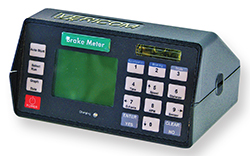
 Computerized solutions deliver precision and accuracy
Computerized solutions deliver precision and accuracy
By David Hubbard
 In the mid-1980s, Roger D. McCumber redirected his passion for modifying sports cars and interest in braking technology to develop one of the first computerized electronic accelerometers for the performance car enthusiast, founding Vericom Computers in the process.
In the mid-1980s, Roger D. McCumber redirected his passion for modifying sports cars and interest in braking technology to develop one of the first computerized electronic accelerometers for the performance car enthusiast, founding Vericom Computers in the process.
Over the 30 years since, Vericom LLC, Rogers, MN, has flourished and grown, earning the respect of public transit, commercial vehicle and fleet maintenance industries worldwide. Vericom’s solutions have streamlined transportation safety testing, accident investigation processes, road safety audits, and aided in solving challenging engineering problems.
Today, the VC4000DAQ is generally accepted as the most user-friendly test instrument for measuring roadway friction, vehicle motion, brake efficiency, vibration and much more. The unique Vericom Run Duration Protocol™ ensures precise synchronization of the four key measurements of physics; acceleration, speed, time and distance.
According to Vericom President Todd Schaeffer, interest from public transportation customers peaked after transit fleet owners saw police and other law enforcement agencies using the Vericom family of performance computers, accelerometers and brake meters for commercial vehicle inspection and accident investigation.
“We did not proactively market our products to transit agencies and fleet organizations,” Schaeffer says. “Many law enforcement investigators who were also commercial transit inspectors eventually led us into the transit market. Ultimately, transit customers and fleet operators began using the Vericom family of products for engineering and brake efficiency testing.”
The work of the transit professional and commercial vehicle inspector includes understanding the Federal Motor Carrier Act and the section specific to Brake Performance (§393.52). Compliance testing to that regulation requires the test vehicle come to a complete stop within the designated distance from a speed of 20 mph. An operator must place any vehicle not meeting this requirement out of service for proper maintenance. Operating a vehicle that does not comply with this regulation will subject the operator to fines and significant increases in insurance and operating costs.
“It is a simple regulation, but an important regulation because it’s all about whether vehicles can stop safely and in time,” says Schaeffer. “The Vericom VC4000 is very easy to use. Each test takes about 10 seconds. At the completion of each test the vehicle brake performance is displayed on the screen of the VC4000, ensuring the driver conducting the test knows immediately whether the braking system passed or failed.”
As Vericom’s popularity grew, Schaeffer says New York, New Jersey and several other states in the northeast adopted the Vericom VC4000 Brake Meter and VC4000 PC as their standard for commercial vehicle testing. The Vericom VC4000 Brake Meter and VC4000DAQ are also important tools across several State DOT organizations for vehicle inspection and maintenance processes.
The Vericom VC4000 family of products has even more uses. The Midwest Roadside Safety Facility, Lincoln, NB, employs Vericom’s VC4000 DAQ in full-scale crash tests of roadside safety devices and emerging intelligent transportation systems (ITS).
Accident reconstruction and investigation professionals such as the Institute of Police Technology and Management, Jacksonville, FL, and Northwestern University Traffic Institute, Evanston, IL, view Vericom as the leading instrument and analysis computer for crash investigation to provide the most accurate and precise data.
The New York Department of Transportation says The Vericom VC4000 Brake Meter and VC4000 PC are integral to its inspection and maintenance processes.
“Given all the regulations that govern public transit and private transportation, these agencies gave us a fresh perspective in testing commercial vehicles,” Schaeffer says. “The Vericom solution makes measuring brake efficiency and road friction simple and reliable.”
He says once the word was out on Vericom, the calls began streaming in from transit operators as well as bus manufacturers and mechanical engineers.
“That is essentially how Vericom got into transit,” Schaeffer says. “This is our history.”

Transdev North America discovers Vericom
Transdev North America based in Lombard, IL, the nation’s largest transit management provider and a division of the global company operating in 19 countries on six continents, stakes its reputation on a commitment to safety, passenger satisfaction and total reliability of its fleet.
Transdev turned to Vericom nearly 15 years ago when one of its client’s maintenance facility in Marietta, GA, reported difficulty with the brake test procedure and meeting Transdev’s strict performance metrics on many of its buses.
Demanding accuracy and precision, Transdev safety standards require the immediate removal of any vehicle that does not meet or exceed the firm’s testing procedure. The fleet maintenance team looked to Transdev leadership and maintenance management for a better brake efficiency testing process; one that was simple yet extremely precise and reliable.
“We asked if they were being tested properly and were always assured that they were,” says Transdev Procurement Director Pam Tozzi Wood, who was on hand for the testing. “The testing procedure in use at the time showed the vehicles as passing. Well, they weren’t. We soon learned the process being used at the local maintenance facility did not meet Transdev’s high quality standards. It was neither thorough nor scientific.”
After identifying the root cause, Transdev selected brake efficiency meters from three different manufacturers to test, which included the brake meter already in use, a new product from Vericom and one from a third brake meter company.
“We wanted to sample these brake meters firsthand to understand how they worked and observe how each one performed,” Wood says. “We tested these brake meters side by side on a current bus to see how accurate they could measure the life of the brakes in their application.”
Each of the three brake meters were attached to the floor of the same bus. Wood recalls one brake meter that went flying off its fixture during a sharp braking maneuver. That provider had relied on a below standard solution to a low-tech problem; while Transdev’s needs required a high-tech solution with the simplicity operators appreciate.
“If the brake meter will not stay put, it certainly won’t deliver accurate information,” Wood says. “This happened more than once – and I can tell you, it wasn’t the Vericom brake meter. For someone who’s not so technical, this was disconcerting to me. It begins with simply securing the device correctly. Our maintenance staff must rely on a dependable process for using the test instrument – including the step for mounting the device to the test vehicle.”
Based on the analysis of the skid marks, speed guns and secondary devices, Transdev says the Vericom VC4000 produced the most accurate information with an accompanied simple user process. The Vericom solution offered the best technical assessment of the braking system including stopping distance and braking rate. The precision of the Vericom solution also helped determine when a vehicle braking system was ready for replacement. The quick report printed after each braking test is logged in Transdev files, which allows Transdev to compare current test results with earlier tests on the same vehicle.
“Our comprehensive process proved that the Vericom instrument was accurate and very easy to use,” Wood says. “That is the simplest way to put it.”
To further validate its findings, Transdev chose to test the Vericom VC4000 Brake Meter in a variety of applications across its North American operations.
“We wanted to test this product against the most demanding challenges in each geographical region,” Wood says. “We found the Vericom VC4000 brake meter can easily withstand the harsh winter weather in the Northeast, rain in the Northwest and the extreme summer heat in the Southwest. The Vericom instrument provided the precision we needed, the simplicity for our operations team and the durability to perform across our vast organization.”
Another upshot was Transdev establishing a national program with Vericom and issuing Vericom brake meters to every location. Today, the company uses Vericom brake meters to test the brakes on the approximately 7,000 buses in the Transdev fleet.
Vericom claims its instruments are precise, smart, and simple, and Schaeffer says there are no big secrets.
“The precision of our products lies in additional sensors and software we use that can differentiate between a vehicle braking and a vehicle suspension in motion,” he says. “Braking sounds simple enough, but to truly understand whether a bus is braking or not is not so simple. When the driver hits the brakes on a commercial vehicle, the vehicle will often pitch forward and even tilt side to side.”
According to Schaeffer, it takes a device with greater precision and accuracy such as the Vericom VC4000 to discern the difference between an actual braking event versus a vehicle just tipping side-to-side or front-to-back. He says some products on the marketplace are not as smart and precise; some are far too complicated, while others are not user friendly.
“Our systems are essentially self-explanatory and do not require a lot of training,” he says. “We don’t over-complicate the process, nor do we offer more information than people need or care about. Mount it to the vehicle with a suction cup and push two buttons to test the brakes. Our customers simply want to conduct their tests and know as soon as possible if their vehicles have passed or failed.”
